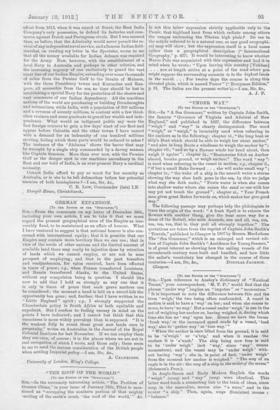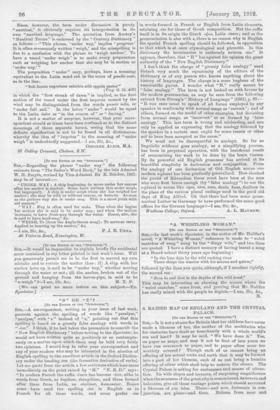[TO TEX EDITOR OP THE " SPRCTATOR."]
Sia,—Upon reference to Anstey's dictionary of "Nautical Terms," your correspondent, M. T. P.," would find that the phrase "under way " implies an " impetus " or " momentum." " It is important to note the difference between this and the term weigh,' the two being often confounded. A vessel in motion is said to have a ' way' on her ; and when she ceases to move, to have' no way.' But a vessel under weigh' is one in the act of weighing her anchor or, having weighed it, during which time she has no ' way' upon her. Hence we have the terms 'fresh way,' or the increased speed made by a vessel, ' lead way,' also to gather way ' or ' lose way.'" " When the anchor is once lifted from the ground, it is said to be a'weigh ' or a'trip,' and when it reaches the surface it is 'a'wa.sh.' The ship being now free is said to be ' under weigh' (not ' way,' since way' means momentum), and the vessel may be under weigh' with• out having way' ; she is, in point of fact, under weigh' from the moment her anchor is weighed." " The way of an eagle is in the air : the way of a ship in the midst of the waves" (Solomon's Prov.). In Anglo-Saxon and Early Modern English the words "weigh" (woeg) and " way" (wwg) were identical. This latter word lends a connecting link to the train of ideas, since wag, in the masculine, means also "a wave," and in the neuter "a ship." Then, again, wage (feminine) means
" balance." Since, however, the term under discussion is purely
"nautical," it obviously requires its interpretation in its own "nautical language." The quotation from Anstey's "Nautical Terms" is endorsed by the "Century Dictionary" as follows :—" This phrase, 'under way,' implies ' progress.' It is often erroneously written ' weigh,' and the misspelling is due to a confusion with the phrase to ' weigh anchor.' To have a vessel ' under weigh' is to make every preparation such as weighing her anchor that she may be in motion or 'under way."
The preposition " under " may, perhaps, have a meaning equivalent to the Latin word sub in the sense of paullo ante, as in the line:
" Sub lucem exportans calathis adit oppida pastor"
(Virg. G. iii. 402) in which the "first streak of dawn" is implied, so the first motion of the vessel under the first impetus caused by the wind may be distinguished from the words passis velis, or " under full sail." In the latter " under" would be equal to the Latin inter or " in the course of " or " during."
It is not a matter of surprise, however, that your corre- spondent should at times have been confused as to the distinct meanings of these separate terms, seeing that the same definite signification is not to be found in all dictionaries, whereby the idea of " impetus " in the meaning of "under weigh" is undoubtedly suggested.—I am, Sir, &c.,
OSBORNE ALDIB, M.A.
85 Oakley Crescent, Chelsea, S.W.











































 Previous page
Previous page